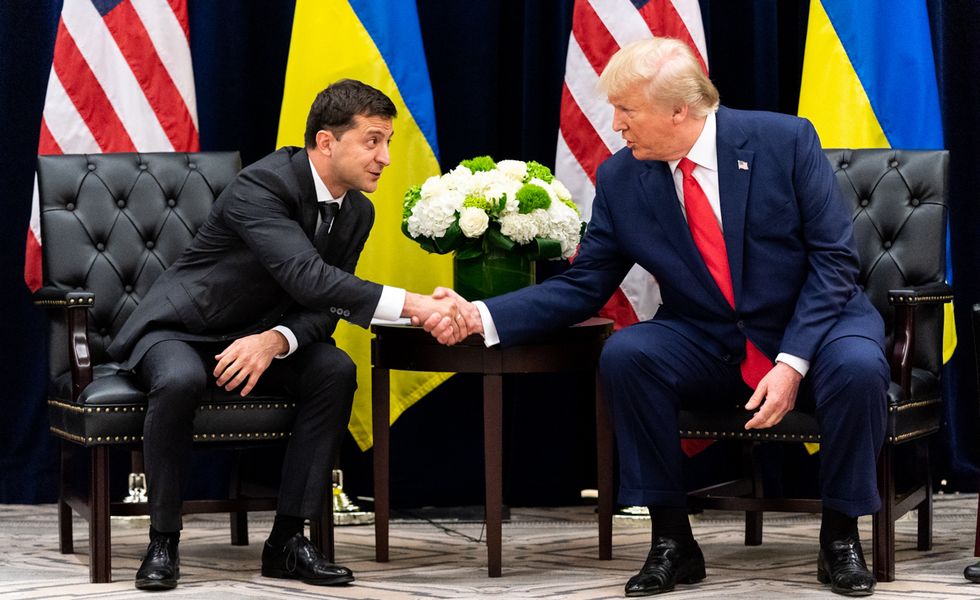Is Trump using the Ukraine playbook to pressure states to bow to his will amid a pandemic?

State and local governments are being hit hard by the economic impacts of the COVID-19 pandemic. Tax revenues are tanking, and their healthcare costs are spiking.
States have had to compete in bidding wars for necessary medical supplies, driving those costs higher than they need be. That's in large part a consequence of the federal government's actions. As David Wallace-Wells writes for New York Magazine, "over the last few weeks, it has started to appear as though, in addition to abandoning the states to their own devices in a time of national emergency, the federal government has effectively erected a blockade — like that which the Union used to choke off the supply chains of the Confederacy during the Civil War — to prevent delivery of critical medical equipment to states desperately in need..."
On top of that outrage, the Feds are bidding against states who are trying to buy their own supplies, and refusing to interfere in those auctions between states, which have driven prices up by ten times or more. But while you might think that was as bad as federal management of this crisis could be, it is not. This new outrage is deeper: Even those states that are trying to manage their own resources, buying equipment themselves with incredibly scarce resources to aid in a time of crisis, are being stopped, and those resources seized on the way to delivery.
Most states are barred by law from running deficits, and that "means in times of crisis, especially those producing huge budget shortfalls through collapsing tax revenue, they are functionally unable to respond at all. In such situations, the federal government is designed to serve as a backstop but over and over again throughout this crisis, the White House has said states will get little to no help."
Meanwhile, Politico reports that "money for state and local governments struggling to deal with the economic fallout from the virus’ lockdowns" has become a "key sticking point" in negotiations over more funding for a small business lending program that ran out of money almost immediately after it was launched. Democrats "have been pushing hard in negotiations for $150 billion" to bail out state and local governments, but it has been "a red line for the GOP and would likely trigger opposition that would derail any agreement."
As of this writing, it looks like Republicans might budge on the issue but the situation is fluid. But it doesn't appear to be the case that they actually oppose keeping state governments afloat in the middle of a crisis. As Politico notes, "they believe if Congress keeps cutting checks for state and local governments, they will be disincentivized to open up their economies."
What the regime hopes to gain by waylaying and presumably stockpiling medical supplies has been an enigma. But the insight that Republicans believe that withholding financial aid will give Trump leverage in his campaign to pressure governors to relax stay-at-home-order suggests that it may be part of a larger scheme to use resources they desperately need to force them to reopen their economies on his timetable, rather than according to when public health experts deem it relatively safe to do so.
If this sounds familiar, it should. When Trump first held up vitally important security aid to Ukraine in the midst of a war with Russia, the reasons weren't clear. We now know that he viewed that aid transactionally, and withheld it in exchange for "a favor," namely fabricating a scandal around Joe Biden. Trump believes the presidency comes with unchecked, monarchical powers. When asked how he could re-open the economy when he had not issued a nationwide shelter-in-place order to rescind, he told reporters, "When somebody’s president of the United States, the authority is total."
Of course that's not what The United States Constitution says. Trump can't order states to lift those orders, and it's easy to imagine that in his impotent rage over not being able to order around other sovereign actors, he's dusted off the Ukraine model to get his way. We know that's why they're opposed to giving the states financial assistance. If that is the motive for waylaying medical supplies--and there may be more than one--that would be even more pernicious.
And in that scenario, every Republican senator except for Mitt Romney of Utah is complicit. During Trump's impeachment hearings in the House, Stanford Law professor Pamela Karlan told members of the House that the Ukraine scandal was akin to Trump telling governors that were “prone to devastating hurricanes and flooding” and went to Trump seeking emergency assistance only to be told, “I would like you to do us a favor”?
Impunity always breeds more lawlessness, and the message that the Senate GOP sent to Trump's White House was that he could get away with this kind of extortion. They may not have believed that he would use similar tactics when American citizens' lives were at stake, but given everything we've seen from Trump over the past three years they certainly should have.


